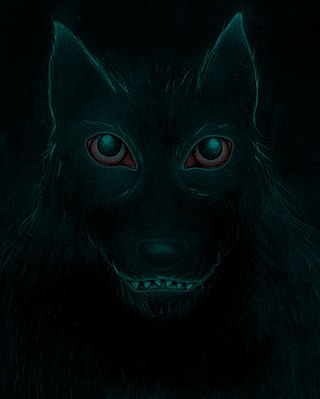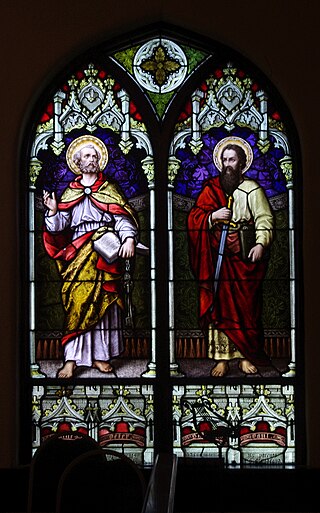Related Research Articles
American folklore encompasses the folklore that has evolved in the present-day United States mostly since the European colonization of the Americas. It also contains folklore that dates back to the Pre-Columbian era.

Father Christmas is the traditional English name for the personification of Christmas. Although now known as a Christmas gift-bringer, and typically considered to be synonymous with Santa Claus, he was originally part of a much older and unrelated English folkloric tradition. The recognisably modern figure of the English Father Christmas developed in the late Victorian period, but Christmas had been personified for centuries before then.

A mince pie is a sweet pie of English origin filled with mincemeat, being a mixture of fruit, spices and suet. The pies are traditionally served during the Christmas season in much of the English-speaking world. Its ingredients are traceable to the 13th century, when returning European crusaders brought with them Middle Eastern recipes containing meats, fruits, and spices; these contained the Christian symbolism of representing the gifts delivered to Jesus by the Biblical Magi. Mince pies, at Christmas time, were traditionally shaped in an oblong shape, to resemble a manger and were often topped with a depiction of the Christ Child.
Presbyter is an honorific title for Christian clergy. The word derives from the Greek presbyteros, which means elder or senior, although many in Christian antiquity understood presbyteros to refer to the bishop functioning as overseer. The word presbyter is used many times in the New Testament, referring both to the Jewish leadership and the "tradition of the elders", and to the leaders of the early Christian community.

Advent is a season observed in most Christian denominations as a time of expectant waiting and preparation for both the celebration of the Nativity of Christ at Christmas and the return of Christ at the Second Coming. Advent is the beginning of the liturgical year in Western Christianity. The name was adopted from Latin adventus "coming; arrival", translating Greek parousia from the New Testament, originally referring to the Second Coming.

Magpies are birds of the family Corvidae. Like other members of their family, they are widely considered to be intelligent creatures. The Eurasian magpie, for instance, is thought to rank among the world's most intelligent creatures and is one of the few nonmammalian species able to recognize itself in a mirror test. They are particularly well known for their songs and were once popular as cagebirds. In addition to other members of the genus Pica, corvids considered as magpies are in the genera Cissa, Urocissa, and Cyanopica.

A leprechaun is a diminutive supernatural being in Irish folklore, classed by some as a type of solitary fairy. They are usually depicted as little bearded men, wearing a coat and hat, who partake in mischief. In later times, they have been depicted as shoe-makers who have a hidden pot of gold at the end of the rainbow.

A Christmas carol is a carol on the theme of Christmas, traditionally sung at Christmas itself or during the surrounding Christmas holiday season. The term noel has sometimes been used, especially for carols of French origin. Christmas carols may be regarded as a subset of the broader category of Christmas music.

The fylfot or fylfot cross and its mirror image, the gammadion are a type of swastika associated with medieval Anglo-Saxon culture. It is a cross with perpendicular extensions, usually at 90° or close angles, radiating in the same direction. However – at least in modern heraldry texts, such as Friar and Woodcock & Robinson – the fylfot differs somewhat from the archetypal form of the swastika: always upright and typically with truncated limbs, as shown in the figure at right.

English folklore consists of the myths and legends of England, including the English region's mythical creatures, traditional recipes, urban legends, proverbs, superstitions, and folktales. Its cultural history is rooted in Celtic, Christian, Nordic and Germanic folklore.

Jitterbug is a generalized term used to describe swing dancing. It is often synonymous with the lindy hop dance but might include elements of the jive, east coast swing, collegiate shag, charleston, balboa and other swing dances.

In English folklore, Black Shuck, Old Shuck, Old Shock or simply Shuck is the name given to a ghostly black dog which is said to roam the coastline and countryside of East Anglia, one of many such black dogs recorded in folklore across the British Isles. Accounts of Black Shuck form part of the folklore of Norfolk, Suffolk, the Cambridgeshire Fens and Essex, and descriptions of the creature's appearance and nature vary considerably; it is sometimes recorded as an omen of death, but, in other instances, is described as companionable.

"Ring a Ring o' Roses", "Ring a Ring o' Rosie", or "Ring Around the Rosie", is a nursery rhyme, folk song and playground singing game. Descriptions first emerge in the mid-19th century, but are reported as dating from decades before, and similar rhymes are known from across Europe, with various lyrics. It has a Roud Folk Song Index number of 7925.

John Brand was an English antiquarian and Church of England clergyman. He was author of Observations on Popular Antiquities: including the whole of Mr Bourne's "Antiquitates Vulgares," with addenda to every chapter of that work.

Charivari was a European and North American folk custom designed to shame a member of the community, in which a mock parade was staged through the settlement accompanied by a discordant mock serenade. Since the crowd aimed to make as much noise as possible by beating on pots and pans or anything that came to hand, these parades were often referred to as rough music.

Shrove Monday is part of the Carnival or Shrovetide celebrations of the week before Lent, following Quinquagesima or Shrove Sunday and preceding Shrove Tuesday or Mardi Gras.
Cockle bread was an inferior type of British corn or wheat bread mixed with "cockle weed". In the 17th century a practice known as "moulding" cockle-bread had a sexual connotation. Cockle bread is also mentioned in a 19th-century nursery rhyme.

The black dog is a supernatural, spectral, or demonic hellhound originating from English folklore that has also been seen throughout Europe and the Americas. It is usually unnaturally large with glowing red or yellow eyes, is often connected with the Devil, and is sometimes an omen of death. It is sometimes associated with electrical storms, and also with crossroads, barrows, places of execution and ancient pathways.
In English folklore, groaning food was food, which was occasionally kept uneaten for superstitious reasons, customarily made and served after childbirth.

"To rob Peter to pay Paul", or other versions that have developed over the centuries such as "to borrow from Peter to pay Paul", and "to unclothe Peter to clothe Paul", are phrases meaning to take from one person or thing to give to another, especially when it results in the elimination of one debt by incurring another. There are many other variants and similar phrases in numerous languages. "Maneuvering the Apostles", which has the same meaning, was derived from this expression. In patchwork, "Rob Peter to pay Paul" is an alternative name for the Drunkard's Path patchwork block.
References
- ↑ Richmond, Leigh (1810). The Fathers of the English Church: Or, A Selection from the Writings of the Reformers and Early Protestant Divines of the Church of England, Volume 6. London: John Hatchard. pp. 643, 655.
- ↑ Brand, John (1905). Brand's Popular Antiquities of Great Britain: Faiths and Folklore; a Dictionary of National Beliefs, Superstitions and Popular Customs, Past and Current, with Their Classical and Foreign Analogues, Described and Illustrated. Reeves and Turner. p. 28.